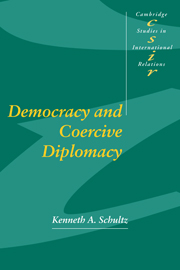Book contents
- Frontmatter
- Contents
- List of figures
- List of tables
- Preface
- 1 Introduction
- Part I Theory
- Part II Empirical analysis
- 5 Selective threats, effective threats: the initiation and escalation of international crises
- 6 Credibility confirmed: the implications of domestic support
- 7 Credibility undermined: the implications of domestic dissent
- 8 Conclusions and implications
- Appendices
- References
- Index
- CAMBRIDGE STUDIES IN INTERNATIONAL RELATIONS
6 - Credibility confirmed: the implications of domestic support
Published online by Cambridge University Press: 08 October 2009
- Frontmatter
- Contents
- List of figures
- List of tables
- Preface
- 1 Introduction
- Part I Theory
- Part II Empirical analysis
- 5 Selective threats, effective threats: the initiation and escalation of international crises
- 6 Credibility confirmed: the implications of domestic support
- 7 Credibility undermined: the implications of domestic dissent
- 8 Conclusions and implications
- Appendices
- References
- Index
- CAMBRIDGE STUDIES IN INTERNATIONAL RELATIONS
Summary
Chapter 5 relied on the broad distinction between democratic and nondemocratic regimes, and the hypotheses were derived by asking how a regime shift in one or both states affects the expected probability of various observable outcomes. In this chapter and the one that follows, we change the focus from variation in institutions to variation in strategies. After all, the institutions do not, on their own, generate the effects considered in the previous chapter. Rather, institutions structure the incentives of political actors within the state, and it is the actual choices made by these actors that determine crisis outcomes. The argument that democratic institutions influence the credibility of threats made in crises was built on explicit claims regarding the public actions taken by government and opposition parties, as well as the effect which those actions have on the beliefs of foreign decision makers. In order to determine whether or not these specific causal mechanisms underlie the correlations we just saw, we need to examine actual crises in greater depth. Does public competition between the government and opposition play out as predicted in the model? Do the parties' strategy choices make sense given their political incentives? Do foreign states pay attention to the resultant signals and act in a manner consistent with the theoretical model?
The model developed in Chapter 4 points to three broad patterns which are of particular interest here:
(1) The government makes a threat, and the opposition supports it. All other things being equal, these “confirmed” threats should have greater credibility than threats made by nondemocratic governments. The targets of such threats should be less likely to resist or take actions to further escalate the crisis.
[…]
- Type
- Chapter
- Information
- Democracy and Coercive Diplomacy , pp. 161 - 196Publisher: Cambridge University PressPrint publication year: 2001



